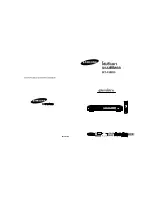
IL 33-K2C-3
Page 1
Effective
10
/00
Digitrip Retrofit System for the
ITE K-Line Breakers: K-1600
(Black or Red), KDON-1600
(Black or Red), and K-2000 (Red)
SAFETY PRECAUTIONS
WARNING
POWER CIRCUIT BREAKERS ARE EQUIPPED
WITH HIGH SPEED, HIGH ENERGY OPERATING
MECHANISMS. THE BREAKERS AND THEIR
ENCLOSURES ARE DESIGNED WITH SEVERAL
BUILT-IN INTERLOCKS AND SAFETY FEA-
TURES INTENDED TO PROVIDE SAFE AND
PROPER OPERATING SEQUENCES. TO PRO-
VIDE MAXIMUM PROTECTION FOR PERSON-
NEL ASSOCIATED WITH THE INSTALLATION,
OPERATION, AND MAINTENANCE OF THESE
BREAKERS, THE FOLLOWING PRACTICES
MUST BE FOLLOWED. FAILURE TO FOLLOW
THESE PRACTICES MAY RESULT IN DEATH,
PERSONAL INJURY, OR PROPERTY DAMAGE.
• Only qualified persons, as defined in the National
Electric Code, who are familiar with the installation
and maintenance of power circuit breakers and their
associated switchgear assemblies should perform
any work associated with these breakers.
• Completely read and understand all instructions
before attempting any installation, operation,
maintenance, or modification of these breakers.
• Always turn off and lock out the power source
feeding the breaker prior to attempting any
installation, maintenance, or modification of the
breaker. Do not use the circuit breaker as the
sole means for isolating a high voltage circuit.
Follow all lockout and tagging rules of the
National Electric Code and all other applicable
codes, regulations, and work rules.
• Do not work on a closed breaker or a breaker with
the closing springs charged. Trip (open) the breaker
and be sure the stored energy springs are
discharged before performing any work. The
breaker may trip open or the charging springs may
discharge, causing crushing or cutting injuries.
• For drawout breakers, trip (open), and then remove
the breaker to a well-lit work area before beginning
work.
• Do not perform any maintenance: including breaker
charging, closing, tripping, or any other function
which could cause significant movement of the
breaker while it is on the extension rails. Doing so
may cause the breaker to slip from the rails and fall,
potentially causing severe personal injury to those
in the vicinity.
• Do not leave the breaker in an intermediate
position in the switchgear cell. Always leave it
in the connected, disconnected, or (optional)
test position. Failure to do so could lead to
improper positioning of the breaker and
flashover, causing death, serious personal
injury, and / or property damage.
• Do not defeat any safety interlock. Such
interlocks are intended to protect personnel and
equipment from damage due to flashover and
exposed contacts. Defeating an interlock could
lead to death, severe personal injury, and / or
property damage.
www
. ElectricalPartManuals
. com


































